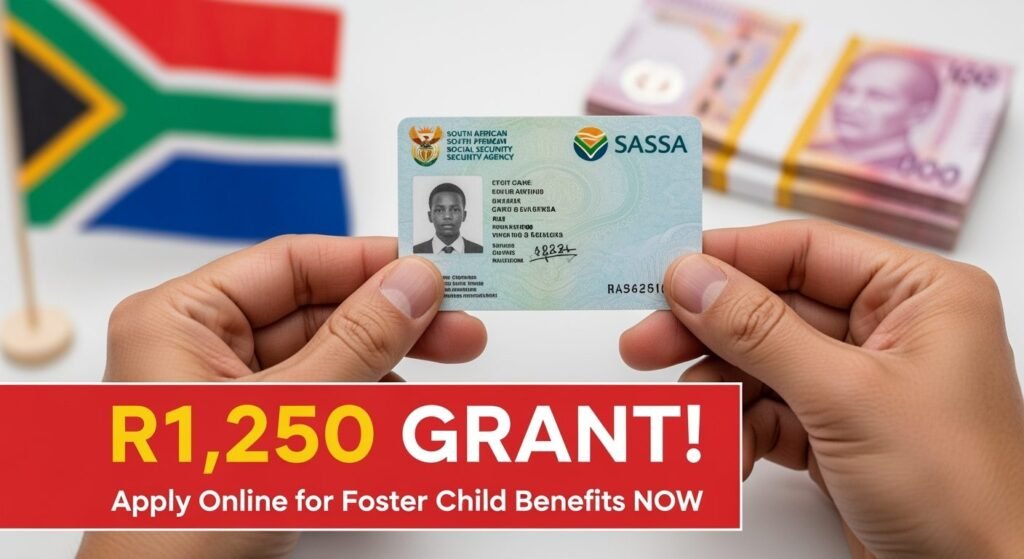Foster Child Grant Application: Are you caring for a child who isn’t biologically yours? The South African government offers financial support through the Foster Child Grant, which will increase to R1,250 by September 2025. I know navigating government benefits can feel overwhelming, but I’m here to guide you through the entire application process. Whether you’re a new foster parent or need to renew your existing grant, understanding how to apply online can save you time and stress while ensuring the children in your care receive the financial support they deserve.

What is the Foster Child Grant?
The Foster Child Grant is a monthly payment provided by the South African Social Security Agency (SASSA) to individuals who have been legally appointed as foster parents by a court of law. This grant aims to provide financial assistance for the basic needs of children placed in foster care. Currently, the grant amount is lower, but it will increase to R1,250 per month by September 2025, reflecting the government’s commitment to supporting vulnerable children. The grant covers essential expenses like food, clothing, education, and healthcare for foster children up to the age of 18, or 21 if they remain in school. Unlike other social grants, the Foster Child Grant isn’t means-tested, meaning your income as a foster parent doesn’t affect eligibility – the focus is entirely on the child’s welfare and legal foster status.
Why Apply for the Foster Child Grant?
Raising a child comes with significant financial responsibilities, and when you open your home to a foster child, these costs can create additional strain on your household budget. The Foster Child Grant provides crucial financial support that helps ensure foster children receive proper care and have their basic needs met. Beyond the immediate financial relief, this grant represents society’s recognition of the valuable role you play as a foster parent. The upcoming increase to R1,250 by September 2025 will further help offset rising living costs and provide more comprehensive support. Additionally, being registered for the grant connects you to the broader social welfare system, potentially making it easier to access other support services and resources designed for foster families. Remember, applying for this grant isn’t just about financial assistance—it’s about ensuring the child in your care has every opportunity to thrive.
How to Apply Online for the Foster Child Grant
Applying for the Foster Child Grant online has become increasingly streamlined. To begin, visit the official SASSA website and create an account if you don’t already have one. You’ll need to complete the electronic application form with details about yourself as the foster parent and the child in your care. The online system will require you to upload scanned copies of essential documents, including: your ID document, the child’s birth certificate, the court order confirming your foster care status, and proof of your bank account details. After submission, you’ll receive a reference number to track your application status. The online system allows you to check your application progress at any time without visiting a SASSA office. If additional information is needed, you’ll receive notifications through the portal. Once approved, SASSA will notify you of the grant amount and payment schedule, with the full R1,250 amount being implemented by September 2025.
| Required Document | Purpose |
|---|---|
| Your ID document | Verify foster parent identity |
| Child’s birth certificate | Confirm child’s age and identity |
| Court order | Prove legal foster care status |
When to Expect Your Foster Child Grant Payment
Once your application is approved, you can expect your first payment within 30 to 90 days, depending on processing times. SASSA typically processes Foster Child Grant payments on a monthly basis, with funds deposited directly into your registered bank account. The payment dates follow a consistent schedule each month, making it easier for you to plan your household budget. By September 2025, all foster child beneficiaries will receive the increased amount of R1,250 per month. It’s important to note that the grant requires renewal every two years, coinciding with the review of the foster care court order. I recommend setting a reminder about three months before your renewal date to begin the process, as this helps prevent any interruption in payments. SASSA will also send notifications as your renewal date approaches, but being proactive ensures continuous support for the child in your care.
Real-Life Success Story
Nomsa from Soweto became the foster parent to her sister’s two children after a tragic accident. Initially overwhelmed by the sudden responsibility, she struggled financially until a social worker informed her about the Foster Child Grant. After applying online, Nomsa received approval within two months. “The grant made all the difference,” she shares. “I could afford proper school uniforms and extra tutoring for the children.” Nomsa is particularly relieved about the upcoming increase to R1,250 by September 2025, as it will help cover the rising costs of the children’s education. Her experience highlights how the grant not only provides financial support but also gives foster parents the confidence to provide quality care for vulnerable children.




